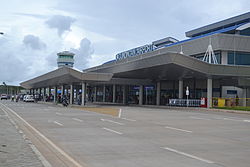Laguindingan, Misamis Oriental
| Laguindingan | |
|---|---|
| Municipality | |

Laguindingan International Airport
|
|
| Nickname(s): Gateway to Northern Mindanao | |
 Map of Misamis Oriental with Laguindingan highlighted |
|
| Location within the Philippines | |
| Coordinates: 08°35′N 124°27′E / 8.583°N 124.450°ECoordinates: 08°35′N 124°27′E / 8.583°N 124.450°E | |
| Country | Philippines |
| Region | Northern Mindanao (Region X) |
| Province | Misamis Oriental |
| District | 2nd district of Misamis Oriental |
| Founded | June 8, 1963 |
| Barangays | 11 |
| Government | |
| • Mayor | Diosdado T. Obsioma |
| Area | |
| • Total | 44.23 km2 (17.08 sq mi) |
| Population (2015 census) | |
| • Total | 24,405 |
| • Density | 550/km2 (1,400/sq mi) |
| Time zone | PST (UTC+8) |
| ZIP code | 9019 |
| IDD : area code | +63 (0)88 |
| Income class | 4th municipal income class |
| 104314000 | |
| Electorate | 17,378 voters as of 2016 |
| Website | www |
Laguindingan is a fourth class municipality in the Province of Misamis Oriental on the Mindanao island, southern part of the Philippines. According to the 2015 census, it has a population of 24,405 people. Most notable landmark is the Laguindingan Airport, located between Cagayan de Oro City and Iligan City.
Laguindingan is politically subdivided into 11 barangays.
Laguindingan used to be called "Daligdigan" coined from the words "daligdig", meaning trickling water from Soloan Creek, and "digan", a buri plant, which was used by the early settlers as roofing and walling materials. The name later evolved into "Laguindingan" because it is easier to pronounce and has a melodious sound.
The presence of an old Spanish port "Moog" at Punta Sulawan manifest the claim that before the settlers came to Laguindingan, the place was the hideout of robbers, pirates and bandoleros because of the once thick forest cover of the municipality. A brave man named Calixto Caseres together with his family moved in from Alubijid and settled for good. Other settlers followed and soon the place became a thriving community. A number of Cagayan de Oro civilians and government officials hide in Laguindingan during the second world war. Blocking force was established in Laguindingan that let Japanese soldiers to use boat instead going to Iligan. The Philippine Independent Church was the first religious order established in the early community. The religious presence was evidenced by the Chapel erected on the highest promontory now known as Salcedo's Hill. The cross still stand today. the silent witness of the establishment of the now growing town.
Laguindingan, was a sitio of Alubijid under the municipality of Cagayan de Oro. The first Barrio Teniente was Mariano Salcedo (from Kauswagan, Cagayan de Oro) which was appointed by the Alcalde de Cagayan. When Alubijid became a municipality, Proceso Pacana became the first Barrio Lieutenant until the end of World War II. Later a move to make Laguindingan a municipality was spearheaded by Glicerio Salcedo (Teniente del Barrio) who became the first Municipal Mayor of the town. The barangays that joined the move for township was known as the Sulawan Block namely: Kibaghot, Sinai, Mauswagon, Moog, Gasi, Aromahon, Tubajon, Sambulawan, Lapad and Liberty. On June 23, 1963 through House Bill No. 5612, President Diosdado Macapagal signed RA 3824, creating the municipality of Laguindingan.
...
Wikipedia

